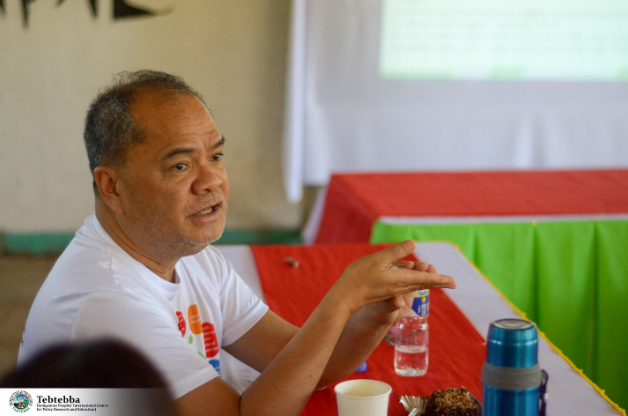
BAGUIO CITY, May 25, 2023 - "Meron pa rin pong mga katutubo talaga na hindi pa sibilisado" (Some Indigenous individuals in our community are still uncivilized), a participant stated, which was addressed and debunked during the training workshop on the Indigenous Navigator framework and tools, in which six members of the Tagbanua Indigenous Group participated in Puerto Princesa, Palawan, Philippines, in April 2023. The objective of the training was to enhance their comprehension of the Indigenous Navigator framework, empowering them to advocate for their rights more effectively.
The statement shared by Elinita C. Orquista, leader of Katutubong Tagbanuang Tangdulanen sa Binga (SAKATTABI), sparked a discussion among participants and implementers. During her sharing, she highlighted the ongoing struggles faced by indigenous peoples. Accordingly, some individuals exhibited hesitancy and a lack of confidence when interacting with people outside of their community, even referring to themselves as “uncivilized”, Orquista shared.
Raymundo Rovillos, professor at the University of the Philippines Baguio, shed light on the historical origins of the observed reluctance within indigenous communities today. According to him, the relocation of indigenous peoples was frequently employed as a strategy to resist the imposition of taxes and forced labor by the government and colonizers in the past.
“Ayaw nila ng pwersadong pinagtatrabaho sila. Ibig sabihin, mas gusto nila ng kalayaan, kaya ang pagtakbo sa bundok at paglayo sa mga taga-patag, iyon ay actually pagtutol sa mga patakaran ng kolonyalismo” (They didn't like being forced to work. In other words, they preferred freedom. As a result, they opted to seek refuge in the mountains and distance themselves from the lowland communities. This was actually their way of resisting against the oppressive policies of colonialism), he added.
Rovillos further explained that the term "uncivilized" was used by the colonizers as a means to marginalize indigenous peoples and paint them as different from the norms established. “Kaya nila [colonizers] binabansagan ang mga katutubo ng ganitong mga negatibong pangalan, dahil tumututol ang mga katutubo na magpasakop… Pero hindi ibig sabihin na hindi sibilisado ang mga katutubo, kailangang i-correct natin yan sa sarili natin” (Colonizers used derogatory names to refer to the indigenous peoples due to the latter’s resistance to colonization. However, their resistance didn't mean they lacked civilization. It's crucial for us to correct this misconception), Rovillos expressed.
Johnmart Salunday, president of the Nagkakaisang mga Tribu ng Palawan (NATRIPAL), also explained that the perception of indigenous communities as uncivilized stemmed from their previous nomadic lifestyle and their lack of a permanent settlement as they searched for food and sustenance. Unfortunately, some people wrongly equated this practice with a lack of civilization, perpetuating this misconception to this day.
“Saan ka ba nakakita ng mga konkretong bahay ng katutubo… tabing-tabing lang tayo noon… Sa amin kasi, ‘pag panahon ng pangangaso doon [kami] sa gubat; ‘pag panahon naman ng ano [pangingisda] diyan naman [kami] sa dagat” (Back then, concrete houses were uncommon as we primarily relied on makeshift shelters. This was because we would later move to the forests during hunting season and settle near the sea for the fishing season), Salunday highlighted.
With support from the European Union, the Indigenous Navigator is a framework and set of tools created for and by indigenous peoples to monitor the recognition and implementation of their rights. It offers free access to community-generated data, benefiting indigenous organizations, communities, duty-bearers, non-government organizations, and journalists. ###

